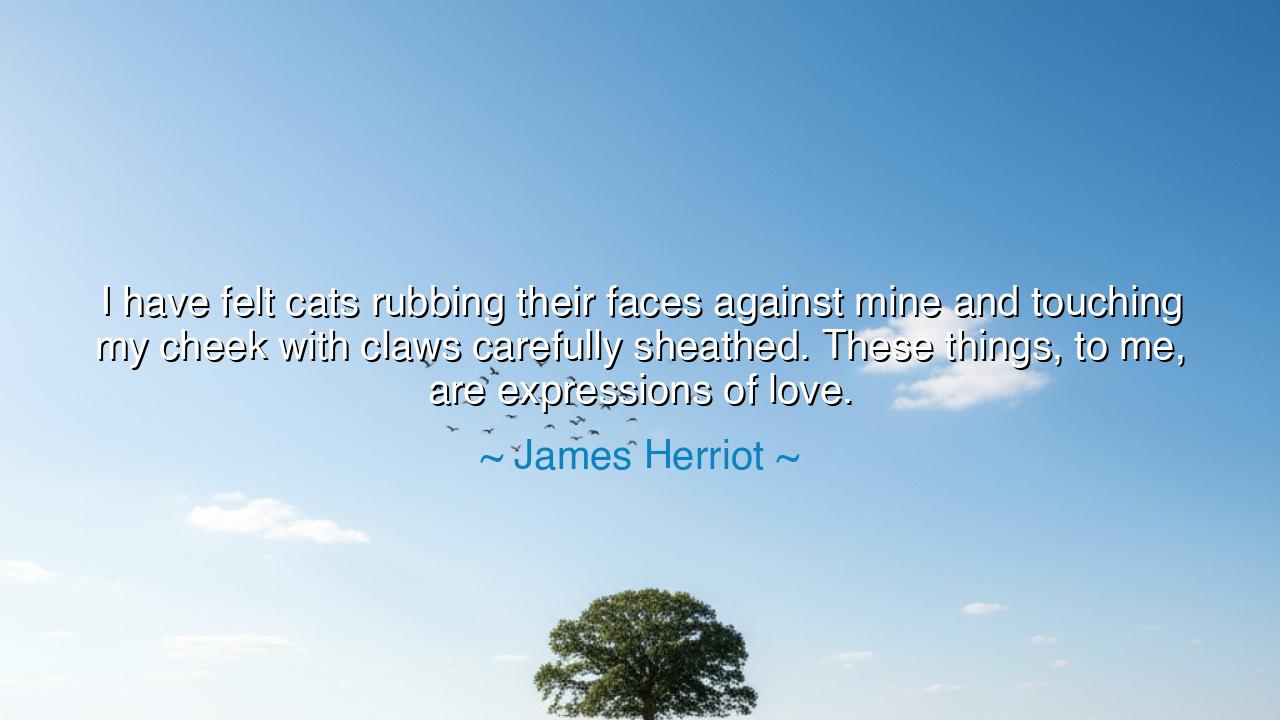
I have felt cats rubbing their faces against mine and touching my
I have felt cats rubbing their faces against mine and touching my cheek with claws carefully sheathed. These things, to me, are expressions of love.






“I have felt cats rubbing their faces against mine and touching my cheek with claws carefully sheathed. These things, to me, are expressions of love,” wrote James Herriot, the humble country veterinarian whose life among animals taught him the quiet language of compassion. In this tender reflection, Herriot captures the sacred truth that love is not always grand or easily understood. It often speaks in whispers, in gestures, in moments so small they could be missed by eyes that do not see with the heart. His words remind us that to truly know love, one must be still enough to recognize it in its many forms — even in the soft brush of a cat’s fur, or the gentle restraint of its hidden claws.
The origin of this quote lies in Herriot’s life and work as a rural veterinarian in Yorkshire, England — a man who spent his days tending to creatures great and small. His writings, drawn from real experience, are filled with reverence for the simple, honest emotions of animals. In their eyes, he saw something unclouded by ambition or deceit — a purity of affection that required no words. When Herriot writes of a cat’s “claws carefully sheathed,” he is describing a love that is both wild and gentle, fierce in potential but restrained by trust. It is a lesson for humanity: that true love is not the absence of power, but the choice to temper it in tenderness.
In the world of the ancients, the cat was revered as a creature of mystery and grace. The Egyptians saw in it a reflection of the divine — protector of hearth and spirit. Yet Herriot’s insight transforms that ancient reverence into something deeply human. He shows us that love, even when expressed by a creature of independence and pride, carries meaning beyond its form. The cat, capable of claws and teeth, chooses softness. It offers not submission, but connection. Such love is not loud, not boastful, but honest — the kind that asks for nothing, yet gives everything it can.
To understand Herriot’s wisdom, one must look beyond the surface. His words are not merely about cats or animals — they are about the nature of love itself. In every life, there are those who express love not through eloquence, but through quiet acts of care: a hand placed gently upon your shoulder, a look that lingers with warmth, a word unspoken yet understood. Love is not always wrapped in grandeur; sometimes it hides in the humblest of gestures. Like the cat who rubs against one’s face, love seeks closeness — not to dominate, but to share presence.
There is a story from Herriot’s own life that mirrors this truth. Once, he visited a lonely farm where an elderly woman lived alone with her animals. Among them was an old cat, scarred and wary, who seldom approached anyone. But when Herriot treated the woman’s dog and prepared to leave, the cat rose and brushed his leg softly, resting its head against his hand. The woman wept quietly and said, “He’s never done that before.” In that small, silent act — a brief brush of fur — Herriot felt the same truth he wrote of later: that love often hides behind caution, and that to earn trust is to receive the purest gift of all.
What Herriot teaches, then, is the importance of attention — the sacred art of noticing. Too often, we overlook the gentle expressions of affection that surround us. We wait for grand declarations, forgetting that love lives in details: in patience, in restraint, in presence. When the cat keeps its claws sheathed, when a friend listens without judgment, when a loved one chooses kindness over anger — these are the quiet miracles that weave the tapestry of love. To recognize them is to live with gratitude; to ignore them is to live half-blind to life’s beauty.
So, dear listener, take this wisdom to heart: love does not always roar — sometimes it purrs. It is found in the smallest gestures, in the care taken not to wound, in the mercy of restraint. Learn to see love not only in words spoken, but in actions withheld — in gentleness where strength could harm. Be like Herriot: observe, feel, and cherish the language of tenderness that flows through all living things.
And when life feels cold or loveless, remember this — that even a creature of claws can teach you compassion. To love, as Herriot understood, is to draw near without hurting, to touch without taking, to give without asking. These things, to him — and to all who have eyes to see — are the true expressions of love.






AAdministratorAdministrator
Welcome, honored guests. Please leave a comment, we will respond soon